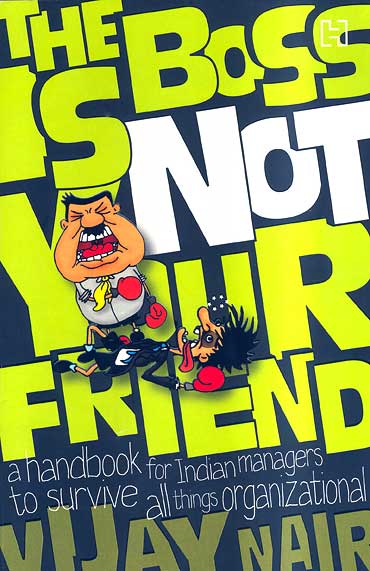
Employees of the world unite; you have nothing else to lose but your jobs...
Wouldn't this spin-off of Karl Marx's pithy saying be apt if one you were bold enough to tell his/her boss that s/he is Dumb, Very Dumb or Unimaginably Dumb?
Consultant, critic, fiction writer, columnist and theatre director Vijay Nair not only said so but has also managed to survive and thrive in what he does best: write.
For he has penned a book The Boss Is Not Your Friend (A handbook for Indian managers to survive all things organisational) that candidly describes six types of bosses -- The Oily Oyster (Oo), The Vicious Viper (Vv), The Flattering Fraud (Ff), The Crafty Conman (Cc), The Burly Bastion (Bb), and The Horny Harry (Hh) -- one can easily find in offices.
Interestingly, the book comes with a simple quiz (we will be publishing the book excerpts as an interactive quiz soon) that helps you label your boss with one of the six types of malevolent bosses.
Vijay, who is a postgraduate diploma in management with specialisation in HR from one of the highly regarded management institutes in India- XLRI, in his book refers to the boss as 'it'.
In e-mail interview with Prasanna D Zore the author gives you one salient feature of each of these six subspecies of bosses, how to butter your boss just before appraisals and how to politely tell your boss that s/he is dumb.
Click here to buy The Boss Is Not Your Friend from rediff Books!

Is this book based on your own experience at the workplace?
I spent nearly a decade in organisations as a manager and after hanging up my boots continue to engage with them as a consultant. All that experience has been put to good use while writing this book.
What makes you think that 'The boss is not your friend'?
Do you think the boss is a friend? How interesting? The only valid criticism about the book I have come across is when young managers scoff at the title saying, "Of course the boss is not your friend. Tell us something new."
What inspired you to write this book?
Like I shared with you I have spent a lot of my life as an insider-outsider and as an outsider-insider in organisations. I didn't have to be inspired. I felt I deserved such a book. This book is a gift I have given to myself.

Oily Oyster, Vicious Viper, The Flattering Fraud, The Crafty Conman, The Burly Bastion, and the Horny Harry are the six types of bosses described by you in the book. Tell us about the one most striking feature of each of these bosses...
The Oily Oyster is the boss who starts off by pretending to be your best friend and then dumps you as soon as the next management trainee walks in.
The Vicious Viper is the boss who dislikes you at first sight and decides to make life hell for you from day one.
The Flattering Fraud says only good things about you and your work in your presence but the moment your back is turned, says something else to your seniors, peers and juniors.
The Crafty Conman is highly competitive and makes sure that you and your performance can never overshadow it or its performance.
The Burly Bastion is like the great wall of China and refuses to make way for you... it stays in the same role for years and years and blocks your progress.
The Horny Harry is challenged... it does not think with its brains... it thinks from somewhere else.

Your book talks about the BLFI: Boss Labelling and Fixing Instrument. Give our readers five or 10 tips to FIX their bosses.
Please let them buy the book and find out. As you know advice that's given for free is never valued.
Give our readers sureshot tips to butter their bosses during appraisal time that the bosses cannot ignore...
1. Ask your boss what is the secret of its eternal youth. That is a sure shot way to get in the good books of the boss: male or female.
2. Share with your boss how you have always thought of it as your role model.
3. Land up at its house in the weekend preceding the appraisal with cake, flowers and maybe some goodies for the gremlin like monsters it has for children.
4. Tell it that you overheard the CEO/MD/Chairman praising it to the high heavens to another member of the board and that once the head honcho realised that you were also in the lift, he turned quiet.
5. Find out its dark secrets and blackmail it to give you a hefty raise or a much-deserved promotion.
6. Stop disagreeing with it on any matter at least a month before the appraisal period.

Give our readers tips to find out if their boss is dumb or smart...
The boss is always dumb. You can only apply a three-point rating scale to assess it. Dumb, Very Dumb or Unimaginably Dumb.
Do you find the boss labels you have described in your book in actual life?
Of course. I am sure if we went out for a friendly drink you too will tell me what category your boss belongs to.
Would you dare to tell your boss if he is dumb without offending him?
You can take this liberty in a nice way... like you can share with it how you tend to do something really dumb sometimes and when it gets all charged up and into the counselling mode by sharing with you how dumb it has been on certain occasions, you can perk up and say "I know... you can be really dumb. The whole team knows how dumb you are."
Tell us about the challenges you faced while writing this book?
None while writing it. But once it has been published my clients have stopped calling me. They don't want me anywhere near their organisation.